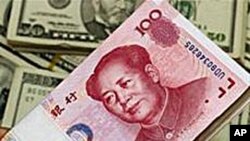As concerns are growing about the possibility of a global currency war, momentum is building in the U.S. Congress for the passage of legislation aimed at punishing China for its practice of undervaluing its currency. While U.S. officials, business lobbyists and trade representatives agree that China is not doing enough to let the value of its currency rise, they disagree on what solution works best.
Last week, just before U.S. lawmakers took a break before the upcoming November mid-term elections, a bipartisan vote in the House of Representatives approved a bill that could open the way for punitive tariffs on products from China.
Supporters of the bill say it has raised the prospect of taking action against China that is long overdue and will finally give the U.S. government more leverage to address the undervaluation of the Chinese currency.
Charlie Blum, the executive director of the Fair Currency Coalition, says the bill is a modest first step toward overhaul of U.S. currency policy.
"An overhaul that is badly overdue, an overhaul that if not accomplished soon may contribute to a new round of currency wars similar to that that deepened the great depression [1930]," he said. " An overhaul that quite frankly all true free traders should welcome and support."
Blum made his remarks Thursday at a forum on China's currency sponsored by the Washington International Trade Association. Blum's Fair Currency Coalition is an association of steel, textile and labor groups that have pressed Congress for years on the issue.
He and other supporters of legislation argue that diplomatic efforts to resolve the issue have failed.
Blum says that while the International Monetary Fund has rules that address currency distortions and their impact on trade, it has little power to compel countries - such as China - to change.
Support for currency legislation that seek to punish China is also strong in the U.S. Senate, where a similar bill sponsored by Senator Charles Schumer, a New York Democrat, has broad bipartisan support.
However, Erin Ennis, vice president of the U.S.- China Business Council says the costs of passing punitive legislation on China's currency outweighs the benefits.
"Those who say the exchange rate has a major impact on the U.S. trade deficit on U.S. jobs are selling Americans a bill of goods [being dishonest, making misleading promises]," said Ennis. "The fact is that the products that we make are goods that have not been made in the United States for years."
Ennis, who also spoke at the meeting on Thursday, says that punishing China with tariffs is unlikely to bring manufacturing jobs back to the United States that moved overseas decades ago.
She says that not only is it unlikely to get China to change, it also would trigger retaliation that could damage U.S. industries.
Ennis notes that 48 hours after the United States announced duties on tires from China last year, China announced anti-dumping tarriffs against U.S. poulty and auto imports.
Ennis says her organization's investigation of the impact of that move on the U.S. tire industry revealed that the duties led to an increase in tire prices in America, an increase of their import from other countries and failed to increase overall tire production or boost employment.
Gary Horlick, a trade lawyer, says there is no doubt China will respond.
"China will retailate, they've said they will retaliate, they do retaliate, I am counsel for the U.S. poultry industry," he said. "We've been hit with 60 percent duties in retaliation for U.S. duties on tires."
Ennis says that while a multi-lateral effort to get China to adopt a market driven exchange rate has been moving "maddenly slow," it is the best approach.
"We need to accept the fact that it is a mult-lateral push on this, as the Treasury Department is calling for, that is going to get the action and not unilateral action," she said.
International pressure against China is building with both the European Union and U.S. Treasury Secretary Timothy Geithner speaking out in recent days, calling on China to let the value of its currency rise.
It is a key topic at upcoming meetings this week of the World Bank and International Monetary Fund and is expected to be high on the agenda during G-20 meetings in South Korea in November.
Just before the last G-20 leaders summit in June, China dropped broke its peg with the dollar, but the currency has only risen about 2 percent in value since then. Some international economists say the Chinese currency is undervalued by as much as 30 percent.
On Thursday, China warned that economic ties might be damaged if U.S. lawmakers escalated the conflict over Chinese currency controls.
U.S. lawmakers will need to act swiftly if they'd like to get any legislation approved. They only have a brief window to pass legislation after they return from elections in November.
If legislation is not approved before the end of the current session of congress, it will die and lawmakers will have to start over.




